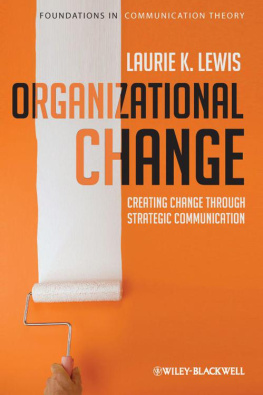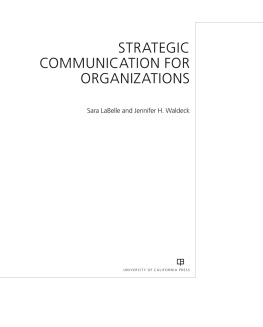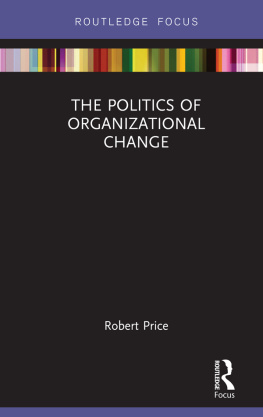Table of Contents
Foundations of Communication Theory
Series Editor
Marshall Scott Poole (University of Illinois, Champaign-Urbana)
Editorial Board
James Aune (Texas A&M University); Robert T. Craig (University of Colorado at Boulder); Leah Lievrouw (University of California Los Angeles); Alan Rubin (Kent State University, Emeritus); David Seibold (University of California Santa Barbara)
The Foundations of Communication Theory series publishes innovative textbooks that summarize and integrate theory and research for advanced undergraduate and beginning graduate courses. In addition to offering state-of-the-art overviews in a broad array of subfields, authors are encouraged to make original contributions to advance the conversation within the discipline. Written by senior scholars and theorists, these books will provide unique insight and new perspectives on the core sub-disciplinary fields in communication scholarship and teaching today.
Published
Organizational Change: Creating Change Through Strategic Communication , Laurie K. Lewis
Forthcoming
An Invitation to Communication Theory , Robert Craig
Foundations of Intercultural Theory , Deborah Cai and Ed Fink
Foundations of Media and Communication Theory , Leah Lievrouw
Managing Privacy , Sandra Petronio
Foundations of Organizational Communication , Linda Putnam and Scott Poole
Theorizing Crisis Communication , Timothy Sellnow and Matthew Seeger
This edition first published 2011
2011 Laurie K. Lewis
Blackwell Publishing was acquired by John Wiley & Sons in February 2007. Blackwells publishing program has been merged with Wileys global Scientific, Technical, and Medical business to form Wiley-Blackwell.
Registered Office
John Wiley & Sons Ltd, The Atrium, Southern Gate, Chichester, West Sussex, PO19 8SQ, United Kingdom
Editorial Offices
350 Main Street, Malden, MA 02148-5020, USA
9600 Garsington Road, Oxford, OX4 2DQ, UK
The Atrium, Southern Gate, Chichester, West Sussex, PO19 8SQ, UK
For details of our global editorial offices, for customer services, and for information about how to apply for permission to reuse the copyright material in this book please see our website at www.wiley.com/wiley-blackwell.
The right of Laurie K. Lewis to be identified as the author of this work has been asserted in accordance with the UK Copyright, Designs and Patents Act 1988.
All rights reserved. No part of this publication may be reproduced, stored in a retrieval system, or transmitted, in any form or by any means, electronic, mechanical, photocopying, recording or otherwise, except as permitted by the UK Copyright, Designs and Patents Act 1988, without the prior permission of the publisher.
Wiley also publishes its books in a variety of electronic formats. Some content that appears in print may not be available in electronic books.
Designations used by companies to distinguish their products are often claimed as trademarks. All brand names and product names used in this book are trade names, service marks, trademarks or registered trademarks of their respective owners. The publisher is not associated with any product or vendor mentioned in this book. This publication is designed to provide accurate and authoritative information in regard to the subject matter covered. It is sold on the understanding that the publisher is not engaged in rendering professional services. If professional advice or other expert assistance is required, the services of a competent professional should be sought.
Library of Congress Cataloging-in-Publication data
Lewis, Laurie K.
Organizational change : creating change through strategic communication / Laurie K. Lewis.
p. cm. (Foundations in communication theory ; 2)
Includes bibliographical references and index.
ISBN 978-1-4051-9190-6 (hardback) ISBN 978-1-4051-9189-0 (paperback)
1. Organizational change. 2. Communication in organizations. I. Title.
HD58.8.L4934 2011
658.45dc22
2011001786
A catalogue record for this book is available from the British Library.
This book is published in the following electronic formats: ePDFs (9781444340341); Wiley Online Library (9781444340372); ePub (9781444340358)
This book is dedicated to Mikyla, Parker, and Craig, whose patience, encouragement, and love made this book possible, and to Pat, Bob, and Mark who taught me to love ideas
Introduction
Only the wisest and the stupidest of men never change
Confucius
If you dont change direction, youll end up where youre headed
Chinese proverb
Change is a prominent feature of organizational, civic, and personal life. Change is something we sometimes seek, sometimes resist, and often have thrust upon us. It would not be an overstatement to suggest that society is rife with change and questions about how, when, and in what ways change ought to occur. Goal achievement, progress, and even the avoidance of crisis very often involve implementing planned changes. Change can serve as means to address many important challenges such as those related to policy, governance, rule of law, philosophy, and distribution of information, rights, and resources; challenges of efficiency, effectiveness, quality, and competitiveness; and challenges hinged on shared values, understanding, and cooperation. These challenges span across many sectors of society including private sector organizations upon which we depend for goods, services, and the basis of our economy; public sector organizations that run our community, state, national, and international governance; and non-governmental or nonprofit organizations that promote community and leisure activity as well as provide for numerous humanitarian, scientific, professional, cultural, and social services.
Change is sometimes necessary to correct past failures and accomplish learning and improvement. And, although decision-makers can often agree on problems to be solved, the principles involved in solving them, and even the specific changes to be made in a given situation, making the change happen through implementing ideas and improvements can be incredibly challenging. For example, in the aftermath of Hurricanes Katrina and Rita or after the 9/11 tragedy, hindsight produced many ideas and suggestions for improvement in preventive measures, security measures, and procedures of first responders among others. In order to realize those changes in time to be prepared for the next hurricane or attack, leaders needed to not only vet the ideas, but figure out how to install changes, deal with conflicting opinions about the changes, provide for necessary adjustments to the ideas as they were introduced, and cope with the unexpected consequences of changes made. These are all tasks of implementation. Failure to implement change as a result of organizational learning can result in repeated failure. One could argue that failure to implement change as a result of what was learned from the Exxon Valdez oil spill in Alaska may have led to the BP oil spill disaster in the Gulf of Mexico years later.
Change is sometimes important because it provides opportunities for growth, development, increasing resources, and seizing a moment that if missed may have negative consequences. Leaders who are frozen in the process of implementing change, who are not able to act efficiently and effectively in bringing an innovative idea into practice soon enough, may be unable to realize the benefits of even the best of ideas. In some cases, being second or third with a great idea is worthless; in some cases resources are so scarce and timing so critical that delays in getting innovation up and running can mean a missed opportunity. If companies, governments, and other collectives who are trying to innovate are not able to swiftly and smoothly bring new ideas into the marketplace or operations the window for innovation may close. Successful implementation is key to realizing the potential of most great ideas.










